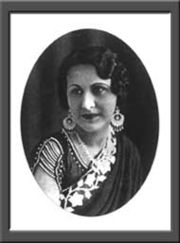Patience Cooper
| Patience Cooper | |
|---|---|
 |
|
| Born | 1905 Calcutta, Bengal Presidency, British India |
| Died | 1993 Pakistan |
| Occupation | Actress |
| Years active | 1920–1946 |
Patience Cooper (1905–1993) was an Indian and later Pakistani film actress. An Anglo-Indian from Calcutta, Cooper had a successful career in both silent and sound films. She was one of the early superstars of Bollywood. Cooper is credited with the first double roles of Indian cinema—as twin sisters in Patni Pratap and as mother and daughter in Kashmiri Sundari, even though earlier in 1917, actor Anna Salunke had played roles of both the male lead character Ram and the female lead character Seeta in the film Lanka Dahan.
Cooper began as a dancer in Bandmann's Musical Comedy, a Eurasian troupe. She later joined Jamshedji Framji Madan's Corinithian Stage Company as an actress.
Cooper first made an impact with Nala Damayanti (1920). The film starred Keki Adajania as Nala and Cooper as Damayanti . The film was a big budget Madan Theatre production and was directed by Eugenio de Liguoro, known in Italy for his Orientalist spectacles like Fascino d'Oro (1919). Nala Damayanti was famous for its special effects at the time — Narada's ascent of Mount Meru to heaven, the transformations of four gods into impersonations of Nala, the transformation of Kali into a serpent among others.
Her next film was Vishnu Avtar, released in 1921. De Liguoro also directed Dhruva Chartitra (1921), a mythological based on the legend of Dhruva whose quest for eternal knowledge and salvation was rewarded when he became the brightest star in the heavens, the pole star also known as Dhruvatara. The film was made as a bid for an international breakthrough for Madan Theatres and featured many Europeans in the cast along with Cooper who played the female lead, Suniti.
One of Cooper's biggest successes was Pati Bhakti (1922). Cooper played Leelavati in the film, directed by the great JJ Madan himself, advocating that women should be devoted to their husband. The film is regarded as her greatest film and was also involved in a small controversy as in Madras, the censor demanded that a dance number be removed on the grounds of obscenity.
...
Wikipedia
